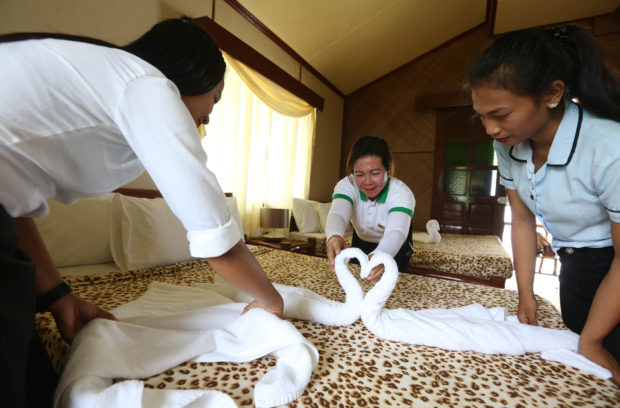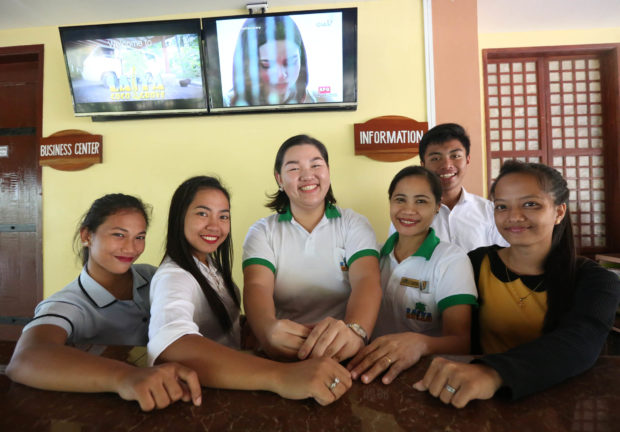K-12 project brings hope to fishing village

RESORT TRAINING Grade 12 students of Laiya National High School learn housekeeping skills during their training as service staff at Laiya CocoGrove Resort in San Juan, Batangas. —MARIANNE BERMUDEZ
(Last of a series)
SAN JUAN, Batangas — “College can wait,” said Daniella Manalo, who was excited about working for the beach resort where she had trained as a senior high school student.
“I want to help my parents first and send my siblings to school,” she said.
Just 10 days after her graduation at Laiya National High School (LNHS) on Friday, Manalo will start work as part of the regular “summer staff” of one of the popular resorts at the fishing village of Laiya here.
Manalo, 18, was hired by Laiya Coco Grove Resort as a contractual employee with a daily pay of P341, slightly above the minimum wage in the Calabarzon region comprising Cavite, Laguna, Batangas, Rizal and Quezon provinces.
Article continues after this advertisementOne of the things she planned to buy with her first paycheck was a cell phone so she won’t have to compete for use of the family’s phone, she said with a cheerful smile.
Article continues after this advertisementK to 12 Plus project
Manalo is one of 353 senior high school graduates of LNHS and one of the 153 who finished the technical-vocational-livelihood (TVL) track under the school’s K to 12 Plus Project.
The project is a partnership between LNHS and the Philippine Chamber of Commerce and Industry’s Human Resources Development Foundation (PCCI-HRDF) that aims to enhance the students’ skills through the dual education and training scheme.
The scheme provides longer hours for “immersion” by students in the workplace, which in Laiya’s case, are its famed resorts.
Manalo is the eldest of three siblings, the youngest still an infant. Her stepfather is a fisherman and her mother, a homemaker.
A cousin, who finished a short course on food and beverage service under the Technical Education and Skills Development Authority (Tesda), encouraged her to take a technical-vocational (tech-voc) course, she said.
“Luckily, they offered tech-voc here.”
She chose the home economics strand, or specialty, of the TVL track. This strand trains students for work in hotels, restaurants and related establishments.
LNHS had 1,500 students for school year 2017-2018, about a third of whom belonged to the senior high class, according to SHS teachers Robert Dimapasok, the school’s immersion coordinator for TVL, and Melvin Viaña, who handles the academic track.
Poor families
A majority of the students come from poor and middle class families who rely mainly on the sea and the resorts for their livelihood.
The school offers only the academic and TVL tracks because it lacks teachers for the arts and design and facilities for the sports tracks. About 75 percent of SHS students chose TVL.
“The academic track looks difficult,” Joanne de Castro said in explaining why she chose TVL.
De Castro, 18, has two brothers working abroad as construction laborers and another at the Philippine Coast Guard station in Batangas. Their parents are both unemployed.
De Castro said she still wanted to go to college to earn some units in a computer course, which may help qualify her for a job in the Coast Guard.
Viaña said many who finished high school under the old curriculum and who did not go to college were jobless, waiting to turn 18 before trying their luck finding employment outside the village.
Most of the high school graduates who went to college took up either education or hotel and restaurant management courses with an eye to working overseas, Viaña said.
“I’ve had a few students who went on to become engineers but I could count them with my fingers,” he said.
Agreement with resorts
In 2013, the school and PCCI-HRDF hammered an agreement with 15 beach resorts, most of them members of the Association of Laiya Resort Owners, to train students in their establishments.
Each student is to spend 800 hours for the training over two years—10 times longer than the hours of work immersion required by the Department of Education (DepEd) for TVL students.
“We still follow the curriculum guide from Tesda (and) DepEd,” Dimapasok said. The only difference between the Plus and the regular TVL program is that Plus students train in the resorts, he said.
Limited openings
Unfortunately, not all TVL students can get into the Plus program primarily due to the limited openings offered by the resorts, which require that they pass a screening, Dimapasok said.
In 2016, the first year of the Plus implementation, 160 students, among them Manalo and De Castro, qualified for the program. Another 124 students were admitted in 2017.
Only 153 students completed the Plus curriculum after seven dropped out of school, mostly due to early marriages. The others in this year’s batch of senior high graduates include 90 who took the regular TVL program and 110 others who took the academic track.
Mary Quieng, Coco Grove’s human resource officer, said students applying for immersion at the resort are asked only basic questions like what they knew about TVL and their willingness to work.
“To me, as long as you’re willing to learn, willing to immerse, that’s already a big factor,” Quieng said.
Coco Grove had nine student trainees in the first year and eight the following school year.
Two of them were transferred to other resorts due to tardiness and absenteeism—the most common complaints resort operators have against the students.
Home economics strands
LNHS offers only four home economics strands—housekeeping, food and beverage services, tourism promotion and front office services.
The training includes cleaning hotel rooms, changing beddings, taking guests’ orders and serving food. Front office and tourism promotion work involves answering phone queries, booking reservations and checking the guests out.
Plus students who complete the training are eligible to take the Tesda assessment test for a national certificate, which validates that their skills and competencies are up to national standard.

WORK BREAK K-12 graduating students join Mary Quieng, human resource officer of Laiya Coco Grove Resort, during a break in their training. —MARIANNE BERMUDEZ
According to Dimapasok, 95 to 99 percent of students who take the test pass it, but the problem is that not everyone can afford the P500 certification fee for each of the four specializations.
Quieng said the resort did not get trainees just for additional manpower. “That’s not the purpose (of the program). That’s unfair.”
She said the only benefit that resorts got from the Plus program was the extra help, but getting that also meant spending extra for teaching and supervising the students.
The resorts are not required to pay the trainees, although some give about P100 to P150 in meal allowance plus uniforms. Students also sometimes get tips of around P50 to P100 from guests.
“The benefit I see is in the future,” Quieng said. “The program helps the local community by training the future working generation. You can’t keep your employees forever. They age and die. At least you have this pool of people who you know can execute the work.”